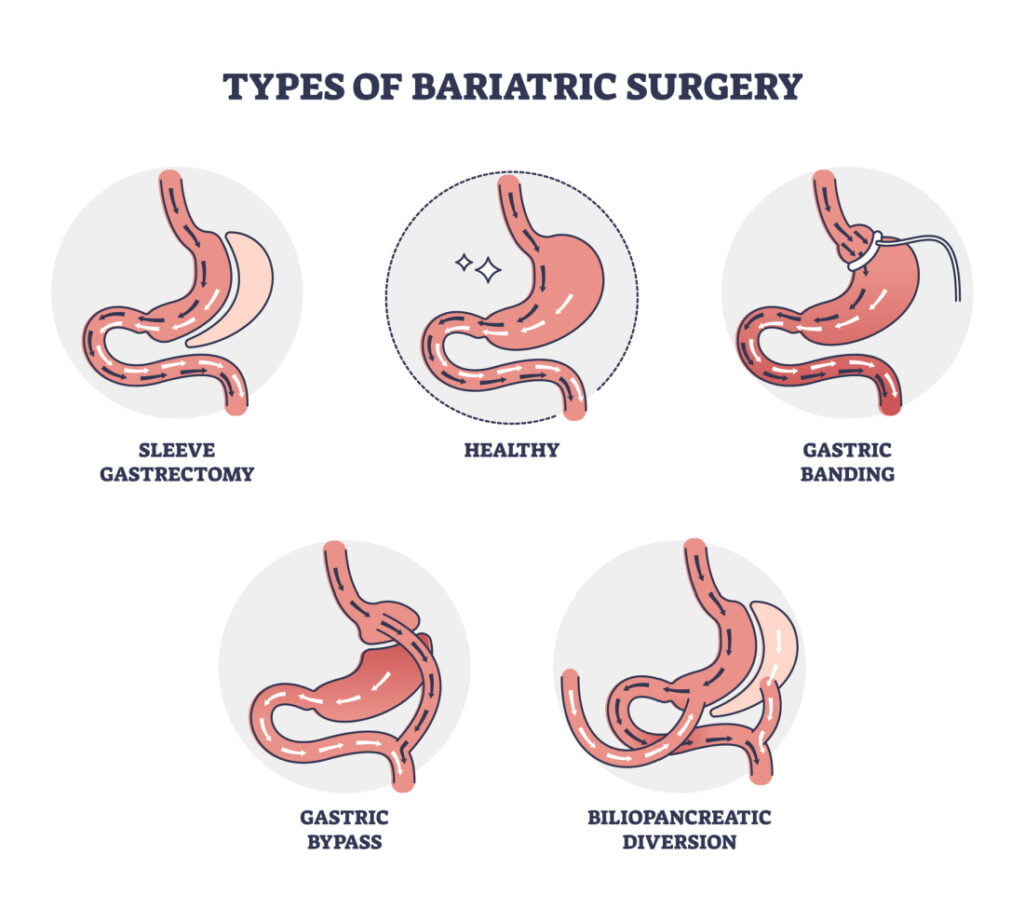Your Weight Loss Surgery Questions, Answered

New insights on effective weight management and modern medical technologies offer potential weight loss surgery patients more options and considerations than ever before. If you’re thinking about bariatric surgery, our Inland Empire weight loss surgery center is here to provide clarity and confidence as you consider this transformative step in your weight loss journey. Here are some of the top questions from patients considering weight loss surgery this year.
- What are the different types of weight loss surgery available in 2024?
- How do I know if weight loss surgery will work for me?
- Can I combine semaglutide with weight loss surgery to lose even more weight?
- What are the risks and potential complications of weight loss surgery?
- How long is recovery after weight loss surgery?
- Will I need to follow a special diet after weight loss surgery?
- How much weight can I expect to lose, and will it be permanent?
What are the different types of weight loss surgery available in 2024?

Common weight loss surgeries include gastric bypass, sleeve gastrectomy, adjustable gastric banding, and biliopancreatic diversion with duodenal switch. Each type has its unique approach:
- Gastric bypass reroutes the digestive system to bypass most of the stomach to reduce food intake and calorie absorption.
- Sleeve gastrectomy removes a portion of the stomach to create a smaller stomach size.
- Adjustable gastric banding places a band (such as the LAP band or Realize band) around the upper part of the stomach to create a small pouch.
- Biliopancreatic diversion alters the digestion process to significantly reduce calorie absorption.
Comparing weight loss procedures online can only give you general information—to determine which of these weight loss surgeries would be the best fit for you, consult with a qualified weight loss surgeon who can discuss your personal goals and individual health and anatomy.
How do I know if weight loss surgery will work for me?
Generally, individuals with a BMI between 30-40, with obesity-related conditions such as diabetes or hypertension, may be considered suitable for surgical weight loss procedures. We typically determine candidacy for weight loss surgery based on factors like your Body Mass Index (BMI), health conditions related to obesity, and previous attempts at losing weight through diet and exercise.
Additionally, candidates must undergo a thorough medical evaluation and commit to post-operative lifestyle changes, including healthy and sustainable diet and exercise regimens. Please note that bariatric surgery is not a quick fix—it is meant as a last resort for people who have exhausted other options.
Can I combine semaglutide with weight loss surgery to lose even more weight?
Yes, if your doctor recommends it, semaglutide injections (the generic term for Ozempic and Wegovy) may be used in combination with weight loss surgery to potentially enhance results. Semaglutide is a medication for diabetes management and weight loss that became a top weight loss treatment in 2023 and will continue to be an effective choice for non-surgical weight loss in 2024. In many cases, patients are choosing to try one approach first, monitor results, then consider combining the two if needed.
Here are a few factors we consider before recommending semaglutide with weight loss surgery:
- Your overall health: Before combining treatments, a thorough health assessment is necessary to evaluate your medical history, current health status, and specific health goals to ensure this treatment combination would be safe and effective.
- How each approach works: Semaglutide works by mimicking GLP-1, a hormone that helps regulate appetite and food intake to reduce hunger and caloric intake. Weight loss surgeries (like gastric bypass, sleeve gastrectomy, etc.) physically alter the stomach and/or digestive process to reduce food intake and nutrient absorption.
- The synergistic effects: For the right patient, semaglutide could potentially help manage hunger cues, which might enhance weight loss and help with long-term weight management after surgery.
- Close monitoring and adjustments: Semaglutide dosages vary by patient needs and are adjusted to minimize side effects and maximize healthy weight loss. It’s also critical that your nutritional intake is carefully managed to prevent deficiencies.
- Considerations and risks: Every treatment has potential risks and side effects; combining treatments can increase these risks or introduce new ones. Choose a weight loss surgeon with a thorough understanding of available surgery techniques and semaglutide weight loss injections, as well; they should have the experience to help you make an informed decision.
What are the risks and potential complications of weight loss surgery?
While weight loss surgery can offer significant mental health benefits and physical health benefits (including reduced risk of death from diabetes), it also carries risks and potential complications like infection, bleeding, and adverse reactions to anesthesia. Long-term risks vary by surgery type but can include nutrient deficiencies, hernias, gastric perforation, and issues related to the surgical alteration of the digestive system. You should discuss these risks with your primary physician, as well as your weight loss surgeon, to understand how they apply to your specific situation before undergoing bariatric surgery.
How long is recovery after weight loss surgery?
The recovery time varies depending on the type of surgery and your overall health. Generally, hospital stays can range from a couple of days to a week, with a gradual return to normal activities in about 2-4 weeks. Once cleared by our surgeons, we recommend patients engage in regular, light physical activity to aid recovery.
Will I need to follow a special diet after weight loss surgery?
Yes, patients must adhere to a special diet after weight loss surgery. Immediately following the surgery, our patients follow a phased diet plan, starting with liquids then progressing to pureed foods, and eventually to regular but healthier foods. This diet is crucial for proper healing and adjustment to the new stomach size or digestion process. Long-term dietary changes usually include high-protein (i.e. lots of chicken and fish), low-carb, and nutrient-dense foods; smaller portion sizes; and specific nutritional supplements to prevent deficiencies.
Maintaining a balanced, nutritious diet post-bariatric surgery is crucial for proper healing and adjustment to the new stomach size or digestion process.
How much weight can I expect to lose, and will it be permanent?
The amount of weight loss varies by surgery type and individual factors like age, starting weight, and adherence to lifestyle changes in the years post-surgery. Generally, patients can expect to lose 30-40% of their excess body weight within the first six months, with continued loss over the next year. Our real patient Kym went from 256 pounds to 138, and was eventually able to reach her goal weight of 135! To get a better idea of how much weight loss you can realistically achieve, you can read about Kym and other weight loss patient success stories here.
To help you experience long-lasting success after weight loss surgery, we provide support groups and nutrition counseling and help you develop an appropriate exercise routine you enjoy before and after the procedure.
Still have questions? Read our FAQ page here »
Reach your weight loss goals this yearTo learn more about your surgical weight loss options, we invite you to call us at 909-579-3111 to set up a free consultation with our surgical team at Surgical Arts of Inland Empire. Our weight loss surgeons are experienced in the latest weight loss surgery techniques and offer compassionate, patient-centered care. We look forward to helping you reach your goals this year!
